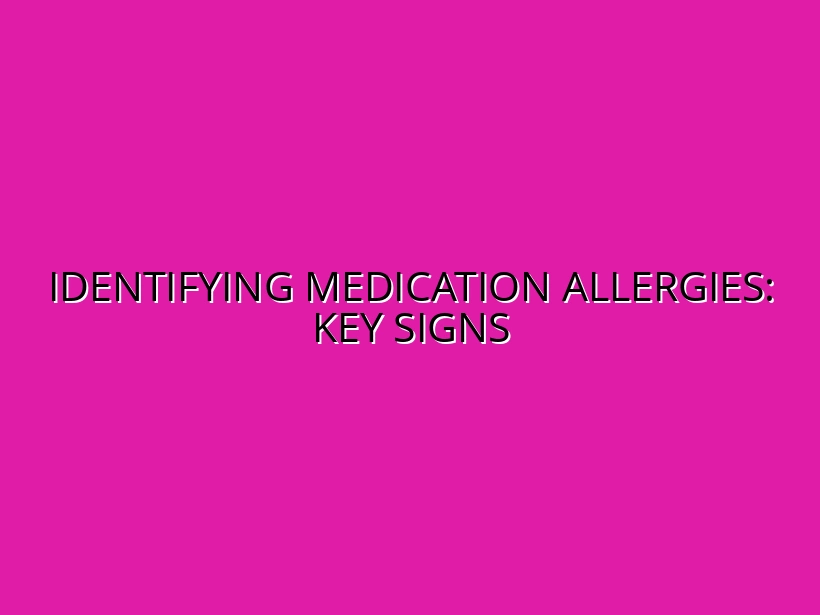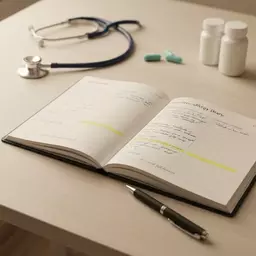Identifying Medication Allergies: Key Signs

Did you know that recognizing medication allergies can be a matter of life and death? Being informed about the signs and symptoms can empower you to take action quickly and effectively.
What You Will Learn
- Common symptoms of medication allergies include skin reactions, gastrointestinal issues, and severe responses like anaphylaxis.
- Recognizing skin reactions such as rashes and hives is critical for early intervention.
- Anaphylaxis requires immediate medical attention; symptoms include difficulty breathing and swelling of the throat.
- Creating a Medication Allergy Action Plan is essential for managing allergies effectively and ensuring safety during reactions.
- Regularly informing healthcare providers about your allergies can prevent serious health complications.
- Understanding cross-reactivity among medications can help avoid unexpected allergic reactions.
- Carrying an EpiPen and knowing how to use it can be life-saving in case of severe allergic reactions.
Key Aspects of Medication Allergy Management
Understanding and managing medication allergies involves recognizing symptoms, identifying triggers, and knowing what steps to take next. This visual summarizes these crucial areas.
Common Allergy Symptoms
- • Skin reactions (rashes, hives)
- • Severe reactions (anaphylaxis)
- • GI issues & Fever
Common Allergen Triggers
- • Penicillin & Antibiotics
- • NSAIDs (e.g., ibuprofen)
- • Vaccines & Anesthetics
Next Steps After Allergy ID
- • Create Action Plan
- • Inform All Providers
- • Medication Review
Treatment & Emergency
- • Antihistamines/Corticosteroids
- • EpiPen for severe reactions
- • Allergist Consultation
Understanding Medication Allergies: Key Signs to Watch For
Medication allergies can be a real challenge to navigate, especially when it comes to recognizing the signs. At I’m Allergic, I'm passionate about educating others on how to identify these reactions early. Being aware of what to look for can make all the difference in managing your allergies safely!
In this section, we'll dive into the common symptoms associated with medication allergies. Knowing these can empower you to take action when necessary.
Common Symptoms of Medication Allergies
Symptoms of medication allergies can range from mild to severe. It's essential to be vigilant, as early recognition can help prevent serious health issues. Here are some of the most common symptoms to keep an eye on:
- Skin reactions like rashes and hives
- Severe symptoms such as anaphylaxis and angioedema
- Gastrointestinal issues and fever
Understanding these symptoms is crucial for anyone managing allergies. Let’s take a closer look at each of them.
Identifying Skin Reactions: Rash and Hives
Skin reactions are often the first and most noticeable signs of a medication allergy. Rashes can appear as red, itchy spots on the skin, while hives may manifest as raised welts. If you notice these symptoms after taking a new medication, don’t ignore them.
Both rashes and hives can indicate that your body is reacting negatively to a substance, and it’s wise to seek medical advice promptly.
Recognizing Serious Symptoms: Anaphylaxis and Angioedema
Anaphylaxis is a severe and life-threatening reaction that requires immediate medical attention. Symptoms can include difficulty breathing, swelling of the throat, or a rapid drop in blood pressure. Angioedema, on the other hand, involves swelling of deeper layers of skin, often around the eyes and lips. For new guidelines and information on treating anaphylaxis, you can refer to resources like the American College of Allergy, Asthma & Immunology (ACAAI).
If you or someone else is experiencing these symptoms, call emergency services right away. Trust me, it's better to be safe than sorry!
Gastrointestinal and Fever Symptoms: What You Should Know
Gastrointestinal symptoms can include nausea, vomiting, diarrhea, or abdominal pain. These symptoms can sometimes be overlooked, as they may be attributed to food rather than medication. However, if you’re experiencing them alongside other symptoms, it could be a sign of an allergy.
Fever can also occur as the body reacts to a medication. It's essential to monitor your temperature and seek medical advice if it becomes persistent.
Common Allergen Triggers: What to Look Out For
Understanding what can trigger a medication allergy is just as important as recognizing the symptoms. There are certain medications that are more commonly associated with allergic reactions. Here are some to be aware of:
- Penicillin and other antibiotics
- Nonsteroidal anti-inflammatory drugs (NSAIDs)
- Certain vaccines and anesthetics
Awareness of these common allergens can help you and your healthcare provider navigate your treatment options more effectively.
Medications Most Frequently Associated with Allergic Reactions
Some medications have a higher likelihood of causing allergies, including:
- Penicillin and its derivatives
- Sulfonamide antibiotics
- Anticonvulsants like phenytoin
When starting a new medication, always inform your healthcare provider of your allergy history. This proactive step can significantly reduce the risk of adverse reactions.
Understanding Drug Hypersensitivity and Its Impact
Drug hypersensitivity is an exaggerated response to a medication that can lead to various symptoms. It’s essential to differentiate this from a standard allergic reaction, as hypersensitivity may not involve the immune system. Understanding this distinction can aid in better management of your allergies and guide your healthcare decisions. For more in-depth information, articles such as "Drug hypersensitivity: A comprehensive review" from PMC (PubMed Central) provide valuable insights.
Remember, if you’re unsure about any symptoms or triggers, don’t hesitate to reach out for more information or guidance. At I’m Allergic, we’re here to help you navigate the complexities of living with allergies safely!
Pro Tip
Did you know? Keeping a detailed record of your medication allergies, including specific reactions and any medications that have caused issues in the past, can significantly enhance your safety. Share this information with every healthcare provider you visit to ensure they can tailor your treatment and avoid potential allergens!
Taking Action: Next Steps After Identifying a Medication Allergy
Identifying a medication allergy is a critical first step in ensuring your health and safety. Once you've recognized the allergy, there are several important actions you can take to manage your condition effectively. In this section, I’ll walk you through essential safety measures and ongoing management strategies that can empower you to live confidently with your allergies.

It's important to remember that a proactive approach can greatly reduce the risks associated with medication allergies. Let’s dive into the steps you should consider taking next!
Safety Measures and Ongoing Management
Creating a solid plan is essential in managing medication allergies. One key component of this plan is having a well-structured Medication Allergy Action Plan. This plan outlines what to do in case of an allergic reaction and helps you feel prepared.
- List your known allergens clearly.
- Include emergency contact information for your healthcare providers.
- Detail the steps to take if you suspect a reaction, including when to use an EpiPen.
- Share your action plan with family and friends who may be with you during a reaction.
Next, it’s crucial to inform all your healthcare providers about your medication allergies. This ensures they can make informed decisions about your treatment options and avoid prescribing any medications that could trigger a reaction.
Creating a Medication Allergy Action Plan
Your action plan should be a living document that you can update as needed. When creating it, consider including:
- Specific medication names you are allergic to.
- Alternative medications that are safe for you.
- Supportive measures to take during a mild reaction.
Having a clear plan can greatly increase your confidence in managing your allergies. You’re not alone in this journey; many individuals have navigated similar experiences, and developing a solid plan has helped them feel more secure.
Informing Healthcare Providers: Importance of Sharing Allergy Information
Every time you visit a new healthcare provider, be sure to share your medication allergies. This includes doctors, dentists, and even pharmacists! Keeping them informed can prevent serious health complications and ensures that your treatment is tailored to your needs. Studies such as "Risk factors for drug allergy in children and adults" published on PubMed highlight the importance of detailed allergy information.
When you communicate your allergies, consider using a medical alert bracelet or a digital app where you can store your allergy information. This can help you communicate your needs quickly in emergency situations.
Medication Review and Cross-Reactivity Considerations
A comprehensive medication review is also a vital step in managing your allergies. Discuss with your healthcare provider potential cross-reactivities among different medications. Some medications can trigger allergic reactions if they contain similar components.
- Example of common cross-reactivities include:
- Penicillin and its derivatives.
- Certain non-steroidal anti-inflammatory drugs (NSAIDs).
- Sulfa drugs across different classes of medications.
Understanding these connections can help you avoid unexpected reactions and ensure safer treatment options in the future.
Allergy Treatment Options: Managing Symptoms Effectively
Managing the symptoms of medication allergies can often involve using specific treatment options. For many individuals, antihistamines and corticosteroids can provide relief.

- Antihistamines can help alleviate mild symptoms such as rashes or hives.
- Corticosteroids may be prescribed for more serious reactions to reduce inflammation.
In cases of severe allergic reactions, having an emergency response plan is crucial. This is where carrying an EpiPen or other auto-injector can save your life.
Using Antihistamines and Corticosteroids for Relief
Make sure to consult your healthcare provider about which antihistamines or corticosteroids are best suited for your situation. Individual responses can vary, and knowing what works for you can make a significant difference in managing your symptoms.
Emergency Response Plans: The Role of EpiPen in Severe Reactions
Having a clear emergency response plan is essential for individuals with medication allergies. If you experience severe symptoms, you may need to use an EpiPen. Ensure you and those around you know how to use it properly.
- Always carry your EpiPen with you, and check the expiration date regularly.
- Educate friends and family on how to administer it in case you are unable.
- Follow up with a healthcare provider after using an EpiPen for further assessment.
Taking these steps can help you stay safe and feel empowered in navigating your medication allergies.
Frequently Asked Questions (FAQs) About Medication Allergies
What are the most common symptoms of a medication allergy?
Common symptoms include skin reactions such as rashes and hives, gastrointestinal issues like nausea and diarrhea, and more severe reactions like anaphylaxis, which can involve difficulty breathing and swelling.
What is anaphylaxis and why is it dangerous?
Anaphylaxis is a severe, life-threatening allergic reaction that can cause widespread bodily system failure. It is dangerous because it can lead to symptoms like difficulty breathing, a rapid drop in blood pressure, and swelling of the throat, requiring immediate medical attention.
Which medications are most likely to cause allergic reactions?
Medications most frequently associated with allergic reactions include penicillin and other antibiotics, nonsteroidal anti-inflammatory drugs (NSAIDs), and certain vaccines and anesthetics.
What should I do immediately after identifying a medication allergy?
After identifying a medication allergy, you should immediately inform all your healthcare providers, create a Medication Allergy Action Plan, and discuss potential cross-reactivities with your doctor. In case of a severe reaction, seek emergency medical attention.
How can an EpiPen help in a severe allergic reaction?
An EpiPen (epinephrine auto-injector) is crucial for managing severe allergic reactions like anaphylaxis. It delivers a dose of epinephrine that can quickly reduce symptoms such such as airway constriction and dangerously low blood pressure, buying critical time until professional medical help arrives.
Resources for Further Support and Information
If you’re looking for additional resources to support your journey with medication allergies, you’re in the right place! There are many organizations and communities dedicated to allergy awareness and education.
Where to Find Help: Connecting with Allergists
Finding a knowledgeable allergist who can provide personalized care is crucial. They can help guide you through testing, treatment options, and ongoing management strategies tailored to your unique situation.
Patient Stories: Real Experiences with Medication Allergies
Sometimes, hearing others’ experiences can be incredibly comforting. Consider joining online forums or local support groups where people share their stories about navigating medication allergies.
By engaging with these communities, you can gain insights, find support, and share your own journey. After all, we are all in this together!
Visual Guides: Symptom Checklists and Flowcharts for Quick Reference
Visual guides can be helpful tools for quick reference. These checklists and flowcharts simplify the complex information surrounding medication allergies and provide immediate action steps. Consider printing them out or saving them on your phone for easy access when you need it the most!
Remember, knowledge is power. At I’m Allergic, we are committed to providing resources that empower individuals like you to navigate allergies with confidence! Let’s embrace this journey together.
Recap of Key Points
Here is a quick recap of the important points discussed in the article:
- Recognize common symptoms of medication allergies, such as skin reactions, gastrointestinal issues, and severe reactions like anaphylaxis.
- Be aware of common allergen triggers, including certain antibiotics, NSAIDs, and vaccines.
- Create a Medication Allergy Action Plan that outlines your known allergens and emergency procedures.
- Inform all healthcare providers about your medication allergies to avoid serious complications.
- Utilize antihistamines and corticosteroids for managing symptoms and always carry an EpiPen for severe reactions.









